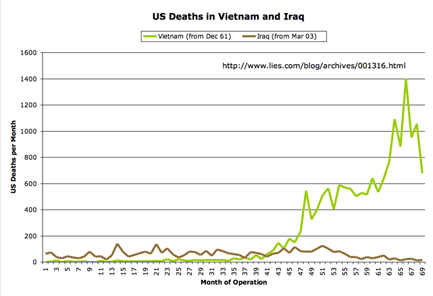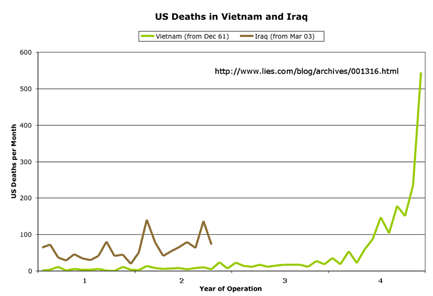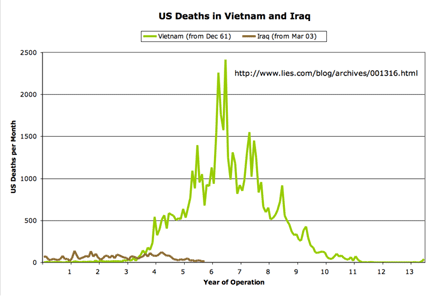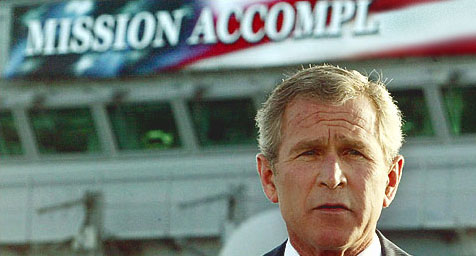I’ve updated my earlier posting comparing the number of US deaths in Iraq and Vietnam at equivalent points in the history of the two wars. My previous charts used a projected figure for October that turned out to be overly optimistic; instead of 32 US military deaths in Iraq last month there actually ended up being 42.
Here are the charts again, updated with the actual number for October. (Again, I’m getting these figures from the advanced search tool at the Vietnam Veterans Memorial Fund site, and from Lunaville’s page on Iraq coalition casualties. The figures are for the number of US dead per month, without regard to whether the deaths were combat-related.)
The first graph shows the first twelve months of the Vietnam war, and the first eight months of the Iraq war. (Click on any image for a larger version.)

Next, the same chart, with the Vietnam numbers extended out to cover the first four years of the war:

Finally, the chart that gives the US death toll for the entire Vietnam war:

There were some interesting comments on the original item. Some people would like to see the comparison expanded to include all casualties, not just deaths. The argument is that this would give a better comparison to Iraq, where the human cost is masked somewhat by the fact that we’ve gotten better at keeping wounded soldiers from dying. Another person was interested in seeing a comparison of deaths normalized for the number of US troops present in-theater at any given time. I think that would be pretty interesting; if you know where I can find statistics on the number of troops deployed in Iraq and Vietnam by month, please let me know.
Another person basically accused me of celebrating soldiers’ deaths because of my hatred of the Bush administration. There’s an element of truth in that accusation. I disagree strongly with this war; I think it is a mistake both in a broad moral sense and in a more narrow, practical sense. I see it as a crime against humanity, justified by lies and pursued by people who lack the moral clarity to recognize the wrong they are committing. Besides being wrong in those terms, though, I believe this war is just plain stupid in a practical sense, in that it will hurt, rather than help, the longterm security interests of Americans (along with pretty much everyone else on the planet), while exacting a terrible price in terms of money and lives.
It’s true that I want to see Bush punished politically for his decision to launch this war, and evidence of the ongoing death toll is an important part of making that case. But it isn’t just personal animosity toward Bush that’s motivating me. I’m not just looking for retribution. I’m looking for deterrence. It’s wrong for politicians to lie their way into wars like this, and then lie about the consequences of their having done so. I’m pissed at Bush about that, but more importantly, I want to stop him, and stop other politicians who would do the same thing in the future. I want to demonstrate to them that, as a practical matter, lying your way into an ill-conceived war is a losing proposition, politics-wise.
Yes, the Iraq war is not yet giving us the kind of horrific death toll we saw at the peak of the Vietnam war. But that isn’t the point. The point is that if a war is wrong, then even one death is a horrible injustice. Forty deaths a month is much worse.
The main tragedy of the Vietnam war, in my mind at least, wasn’t the number of people who died. It was the number of people who died needlessly. It was the fact that having pledged their lives to protect their country from harm, soliders had those lives wasted in pursuit of a very different, and much less noble, goal: protecting politicians from the embarrassment of admitting that their policies had failed.
I believe that’s exactly what’s happening now. And I want it to end sooner, rather than later.




